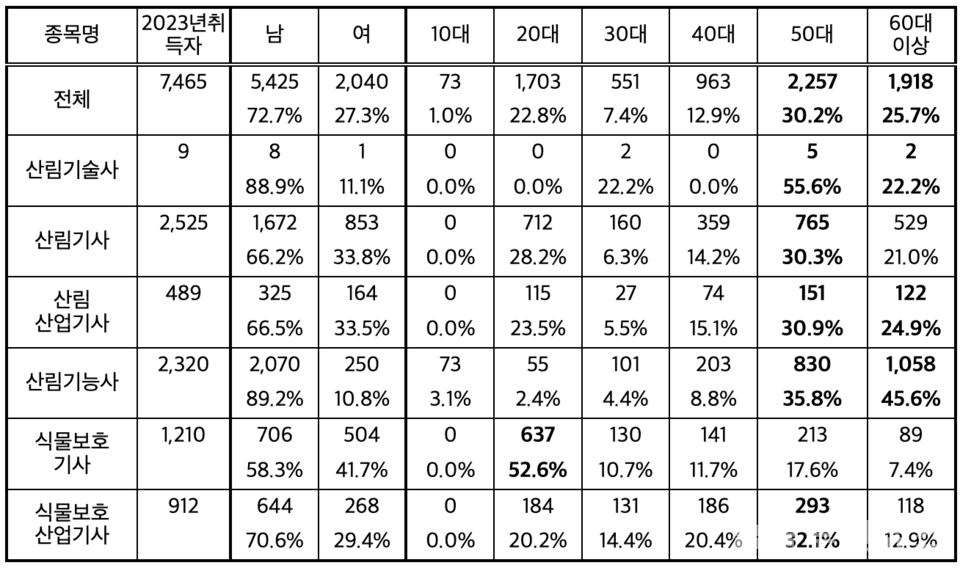The acquisition of national technical qualifications in the forestry and plant protection fields has steadily increased over the past five years, garnering significant interest from seniors.
The Korea Industrial Manpower Corporation announced the examination and acquisition status of national technical qualifications in six categories in the forestry and plant protection fields ahead of Arbor Day on April 5. According to the statistics, from 2019 to 2024, the number of exam applicants increased by an average of 5.4% per year, and the number of otainments increased by 6.2%. As of 2024, the total number of applicants was recorded at 20,681, with 8,084 qualifications obtained.
The forestry field consists of △forestry technician △forestry specialist △forestry industrial engineer △forest technician, and the plant protection field consists of △plant protection engineer △plant protection industrial engineer. Among these, forest technician and forestry engineer have a high participation rate, with more than 5,000 applicants annually.
The amendments to the Forest Protection Act, which introduced the arborist system in 2018, have directly impacted the increase in applicants for related certifications. The law mandates that only those holding an arborist or tree treatment technician qualification can engage in tree care, thereby increasing the demand for qualification acquisition among professionals.

An analysis of the age group of qualification holders showed that as of 2023, those in their 50s accounted for 30.2%, and those 60 and older accounted for 25.7%, making up more than half. Notably, 45.6% of those who obtained forest technician qualifications were 60 and older.
When looked at from the perspective of employment status, 36.6% of the applicants were employed, 20.7% were job seekers, and 17.3% were students. The primary purposes for acquiring the qualifications were employment (43%) and self-development (25.8%).

Labor market performance also confirmed the strength of the senior demographic. As of July 2024, the employment rate based on employment insurance for those who obtained qualifications in 2023 was 48.0% for people in their 50s and 69.6% for those 60 and over. This is higher compared to 36.4% in their 20s, 37.7% in their 30s, and 36.4% in their 40s. The employment insurance statistics exclude public servants and self-employed individuals, suggesting that the actual employment rate may be higher.
By qualification, the employment rates for forest technicians and forestry engineers were 71.9% and 67.5%, respectively, while plant protection engineers and plant protection industrial engineers had comparatively lower rates of 36.5% and 33.1%.
In addition, the corporation is running a process evaluation-type national technical qualification that allows individuals to receive certifications after completing specific educational courses and passing evaluations without the need to meet other application requirements. This system is being implemented in forestry industrial engineer and plant protection industrial engineer programs.
Lee Woo-young, the president, stated, “On the occasion of Arbor Day, we have announced the trends in national technical qualifications in the forestry and plant protection fields, which contribute to eco-friendly, sustainable growth,” adding, “Going forward, the corporation will continue to operate national technical qualification systems that benefit various industrial sectors, opening the era of a ‘qualification renaissance.’”